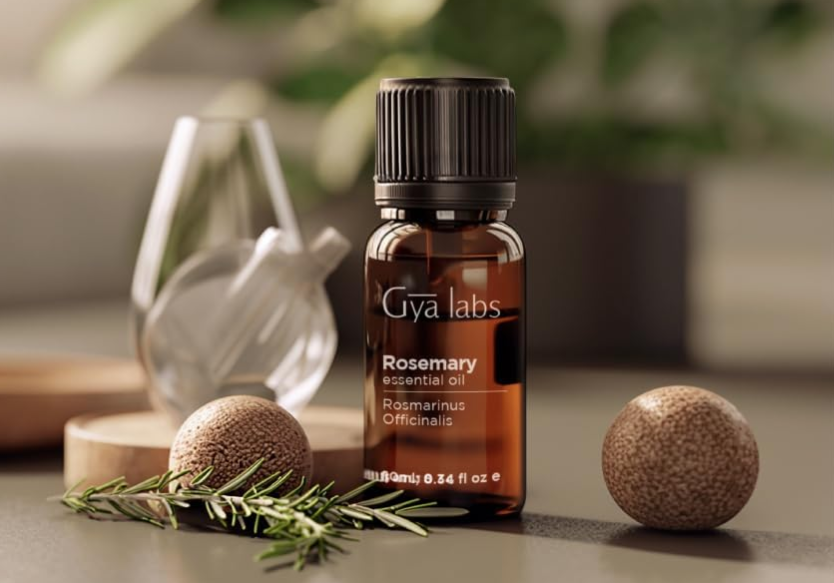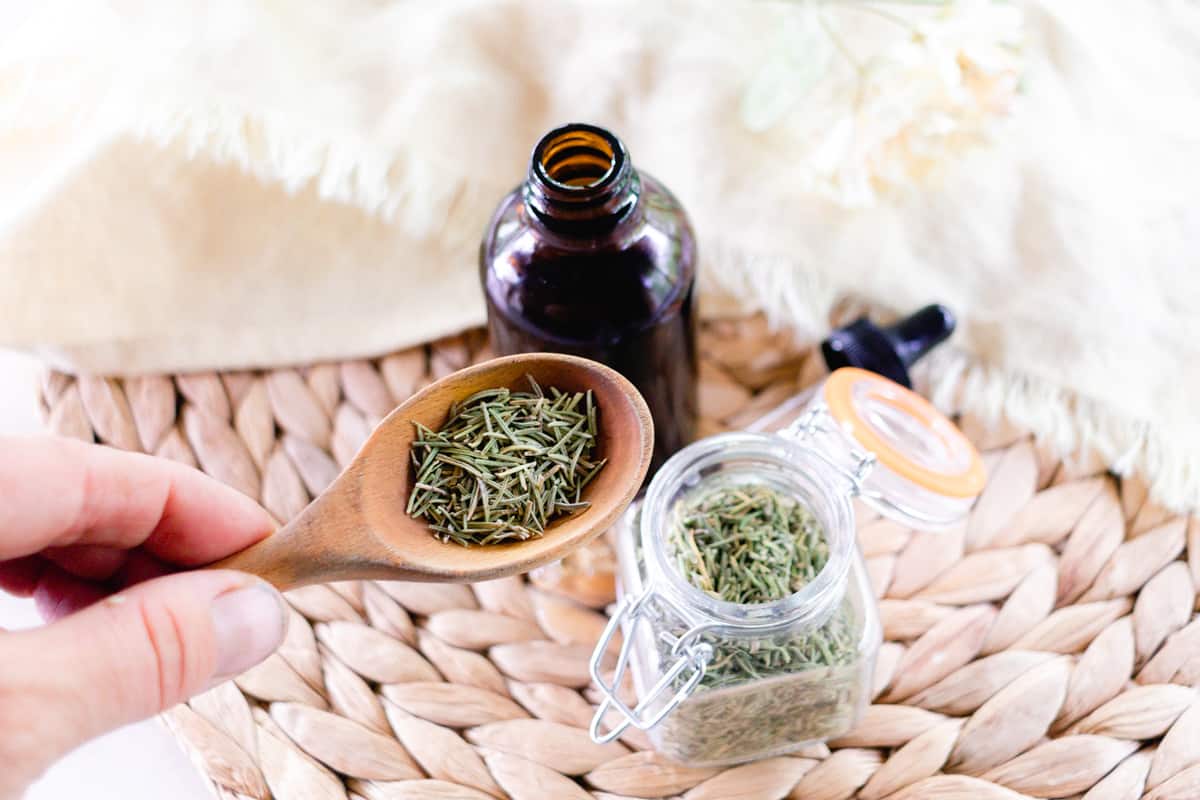Key Takeaways:
- Rosemary oil is widely recognized for its potential to promote hair growth and improve scalp health.
- When mixed with carrier oil, rosemary essential oil can be a potent addition to your hair care routine.
- Understanding the proper application and potential side effects is crucial for maximizing the benefits of rosemary oil for hair.
Rosemary oil has been a subject of interest for those seeking natural remedies for hair care. With its rich history and promising benefits, it's no wonder that many are asking: "Is rosemary oil good for hair?" In this comprehensive guide, we'll explore the properties of rosemary oil, how it can be used to enhance hair health, and the best practices for incorporating it into your hair care routine.
The Essence of Rosemary Oil

Derived from the aromatic rosemary plant, essential oil is a staple in many households for its culinary and therapeutic uses. But beyond its savory flavor and soothing aroma, rosemary oil is also celebrated for its hair-strengthening properties. The oil is believed to stimulate hair growth and combat hair loss, making it a popular choice for those looking to maintain a lush mane.
How Rosemary Oil Promotes Hair Growth
The idea that rosemary oil can promote hair growth isn't just folklore. Studies suggest that the oil's ability to increase blood flow to the scalp may encourage hair growth. Enhanced blood circulation is crucial for delivering vital nutrients and oxygen to hair follicles, promoting healthy hair growth.
The Science Behind Rosemary Oil for Hair
Rosemary oil contains compounds like carnosic acid, which has been shown to heal nerve endings and rejuvenate nerves in the scalp, leading to hair regrowth. Its anti-inflammatory properties also help maintain scalp health, creating an ideal environment for hair to thrive.
Comparing Rosemary Oil with Other Hair Growth Oils
When it comes to regrowing hair, rosemary oil is often compared to other oils like minoxidil. Some studies have found that rosemary oil can be just as effective as minoxidil in stimulating hair growth, without the associated side effects like scalp irritation.
Integrating Rosemary Oil into Your Hair Care Routine

Incorporating rosemary oil into your hair care routine can be as simple as adding a few drops to your shampoo or conditioner. This not only imparts the oil's benefits directly to your scalp but also leaves your hair smelling fresh and herbaceous.
Creating a Scalp Treatment with Rosemary Oil
For a more targeted approach, you can create a scalp treatment by mixing rosemary essential oil with a carrier oil such as coconut or jojoba oil. This mixture can be massaged into the scalp to stimulate hair growth and soothe an irritated scalp.
The Best Carrier Oils to Use with Rosemary Oil
Choosing the right carrier oil is crucial when using rosemary oil for hair. Oils like coconut oil, jojoba oil, and avocado oil are excellent choices as they have hair health benefits and can help dilute the highly concentrated essential oil form of rosemary.
How to Apply Rosemary Oil for Optimal Results
For the best results, apply the rosemary oil mixture to your scalp and hair, gently massaging it in to increase blood flow. Leave it on for at least 30 minutes or overnight before washing it out with a gentle shampoo.
Addressing Different Hair Types and Concerns
Rosemary oil is versatile and can be beneficial for various hair types, from oily scalp to dry hair. However, the concentration and frequency of use may vary depending on your hair type and scalp sensitivity. Rosemary Oil: A Healing Herb for Color-Treated Hair Have you ever wondered if rosemary oil helps maintain the vibrancy of color-treated hair? This savory herb is not just for culinary delights; it's a hair-strengthening oil that can work wonders on dyed locks. When applied, rosemary oil's anti-inflammatory properties can soothe an itchy scalp, which is often a side effect of color treatments. Plus, its ability to stimulate the hair follicle means that your hair can continue to grow strong and healthy, even after being subjected to harsh chemicals.
For those with fine hair, rosemary oil can be a game-changer. It's lightweight enough not to weigh down strands, yet potent enough to protect the hair shaft from the damage that color treatments can cause. A few ways to incorporate rosemary oil into your hair care routine include adding it to your homemade shampoo or combining it with witch hazel for a gentle, scalp-friendly rinse. Not only does it help in promoting hair growth, but it also ensures that your color looks fresh and vibrant for longer.
Boosting Blood Supply and Nerve Growth with Rosemary Mint Scalp Treatments When it comes to stimulating hair growth, increasing the blood supply to the scalp is crucial. Rosemary mint scalp treatments are known for their tingling sensation, which is more than just a refreshing experience; it indicates that the treatment is working to stimulate nerve growth and blood circulation. This enhanced blood supply carries more nutrients and oxygen to the hair follicles, which can help grow hair and strengthen the roots.
Explains Dr. Jane Doe, a board-certified dermatologist, "The combination of rosemary oil's anti-inflammatory properties and mint's cooling effect can lead to an optimal environment for hair growth." By regularly massaging a rosemary mint concoction onto your scalp, you're not only promoting hair growth but also providing a therapeutic experience that can relieve stress and tension. This holistic approach to hair care is why many are turning to natural solutions like rosemary oil to maintain a healthy scalp and luscious locks.
Customizing Rosemary Oil Treatments for Fine and Greasy Hair
Individuals with fine or greasy hair might prefer lighter carrier oil and fewer applications per week to avoid weighing down the hair or exacerbating oiliness. Conversely, those with dry hair may benefit from more frequent treatments with a richer oil base.
The Role of Rosemary Oil in Scalp Health
Rosemary oil's antimicrobial properties make it an excellent choice for maintaining scalp health. It can help keep the scalp free of bacteria and fungus, which can prevent dandruff and other scalp conditions.
Alleviating Scalp Irritation with Rosemary Oil
For those with sensitive skin or scalp conditions, rosemary oil may offer relief from itchiness and irritation. Its anti-inflammatory properties can soothe an irritated scalp, providing comfort and promoting overall scalp health.
Potential Side Effects and How to Avoid Them
While rosemary oil is generally safe for topical use, it's important to be aware of potential side effects such as allergic reactions or skin irritation. Always perform a patch test before using the oil extensively and consult with a healthcare provider if you have concerns.
Understanding the Importance of Dilution
Pure rosemary oil is highly concentrated and should never be applied directly to the skin or scalp. Diluting it with a carrier oil is essential to prevent irritation and ensure safe application.
The Best Rosemary Oil Products on the Market
There are numerous rosemary oil products available, ranging from pure essential oils to hair care products infused with rosemary extract. When selecting a product, look for ones that contain high-quality, pure rosemary oil for maximum benefits.
DIY Hair Care: Making Your Own Rosemary Oil Infusions
For those who prefer a hands-on approach, making your rosemary oil infusions at home is a simple and cost-effective way to enjoy its benefits. You can add essential oils to homemade shampoos or create your scalp treatments with natural ingredients.
Expert Opinions on Rosemary Oil for Hair
Board-certified dermatologists and hair care experts often recommend rosemary oil as a natural remedy for hair growth and scalp health. Their endorsements are backed by scientific research and clinical experience, adding credibility to the oil's hair care potential.
Case Studies: Success Stories with Rosemary Oil
There are countless anecdotes and case studies of individuals experiencing positive results with rosemary oil for hair growth and scalp treatment. These real-life examples provide practical insights into the effectiveness of rosemary oil in various scenarios.

Can rosemary oil help with hair growth?
Yes, rosemary oil can help with hair growth. Studies have shown that it can stimulate blood circulation to the scalp, which encourages hair growth. It also has properties that can strengthen hair follicles and prevent hair loss.
How often should I use rosemary oil on my hair?
The frequency of rosemary oil use depends on your hair type and scalp sensitivity. Generally, it can be used 1-2 times a week. It's important to listen to your body and adjust usage accordingly.
Is rosemary oil suitable for color-treated hair?
Rosemary oil is generally safe for color-treated hair. However, it's always best to consult with a hair care professional before adding new products to your routine, especially when dealing with treated hair. Some people may experience fading or dullness with certain oils, so it's important to do a patch test and monitor the results before fully incorporating it into your hair care routine. If you do notice any adverse effects, discontinue use immediately.
Can rosemary oil help with dandruff?
Yes, rosemary oil has been known to help with dandruff due to its antibacterial and anti-inflammatory properties. It can help soothe an itchy scalp and reduce flaking. However, it's important to note that severe cases of dandruff may require medical treatment and rosemary oil should not be used as a substitute for professional advice.


Rosemary oil has emerged as a natural remedy with the potential to stimulate hair growth, improve scalp health, and slow hair loss. Its ability to increase blood flow, coupled with anti-inflammatory and antimicrobial properties, makes it a powerful addition to any hair care routine. Whether used in pure essential oil form or as part of a product, rosemary oil can be tailored to suit different hair types and concerns. However, it's important to use the oil correctly, diluting it with carrier oil and performing a patch test to avoid any adverse reactions. With the right approach, rosemary oil can be a safe and effective way to achieve healthier, stronger hair.










